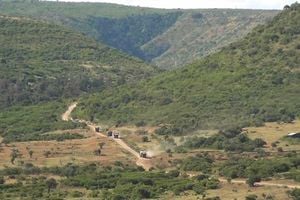
Residents hold peaceful demonstrations in Maralal town, Samburu County on February 26, 2024, following the killing of Angata Nanyekie Ward MCA Paul Leshimpiro.
Kelvin, a Form Four student at Morijo Secondary School in Samburu North, has been suffering from anxiety for most of this year.
He says incessant banditry attacks have not only made life at school terrible, but have also affected the mental states of his colleagues at the learning institution that is located on the Maralal-Baragoi highway.
“Every time you want to concentrate on your studies, you hear the sound of gunshots and immediately run to the dormitory,” laments the 18-year-old.
The school hugs a tiny nook in the vast scarred land whose rugged terrain offers sanctuary to hundreds of vicious killers. Life here is one of constant fear.
Learning at Morijo Primary School was suspended two weeks ago, as more than 100 families fled their homes. In the past three weeks, attacks have been reported in Soit Pus, Lorian and Morijo, with at least four people killed, among them a national police reservist. While an uneasy calm is returning to the volatile region, the events are still fresh in the minds of residents.
Morijo Secondary School headteacher Irene Kamande says it is a challenge to keep students in school amid the violence. She says the security situation around the school is getting worse by the day “and there is growing fear among the pupils and even the staff”.
Getting supplies from Maralal town or Nakuru has been a nightmare as most traders are afraid, Ms Kamande says. During breaks, instead of laughter and chatter, a tense silence pervaded the atmosphere. Some learners have lost their relatives and they live in constant fear of becoming the next victims.
“You can imagine the fear with gunshots sounding almost every hour. A little rustle in the nearby bushes sends the students scampering,” she says.
But despite the darkness, Morijo Secondary School recorded impressive results in the 2023 Kenya Certificate of Secondary Education (KCSE) exams, managing a mean grade of 7.6, with 84 students securing direct university entry, according to Ms Kamande.
“We want the narrative to change because if you are in a school that has an average score of 7.6 and 84 students go to university despite these challenges, then we can do better if we get security,” says Ms Kamande.
Samburu Governor Lati Lelelit says the current environment around Morijo Secondary School is not conducive for learning. He says it is unacceptable for students to go through the security challenges “in this century”.
Teachers’ unions have also protested the deteriorating security situation in learning institutions.
Recently, the Kenya Union of Post Primary Education Teachers and the Kenya National Union of Teachers threatened to withdraw their members from bandit-prone areas.
The unions also threatened to instruct their members to down their tools should the government fail to take decisive action to address the worsening insecurity in parts of Samburu.









